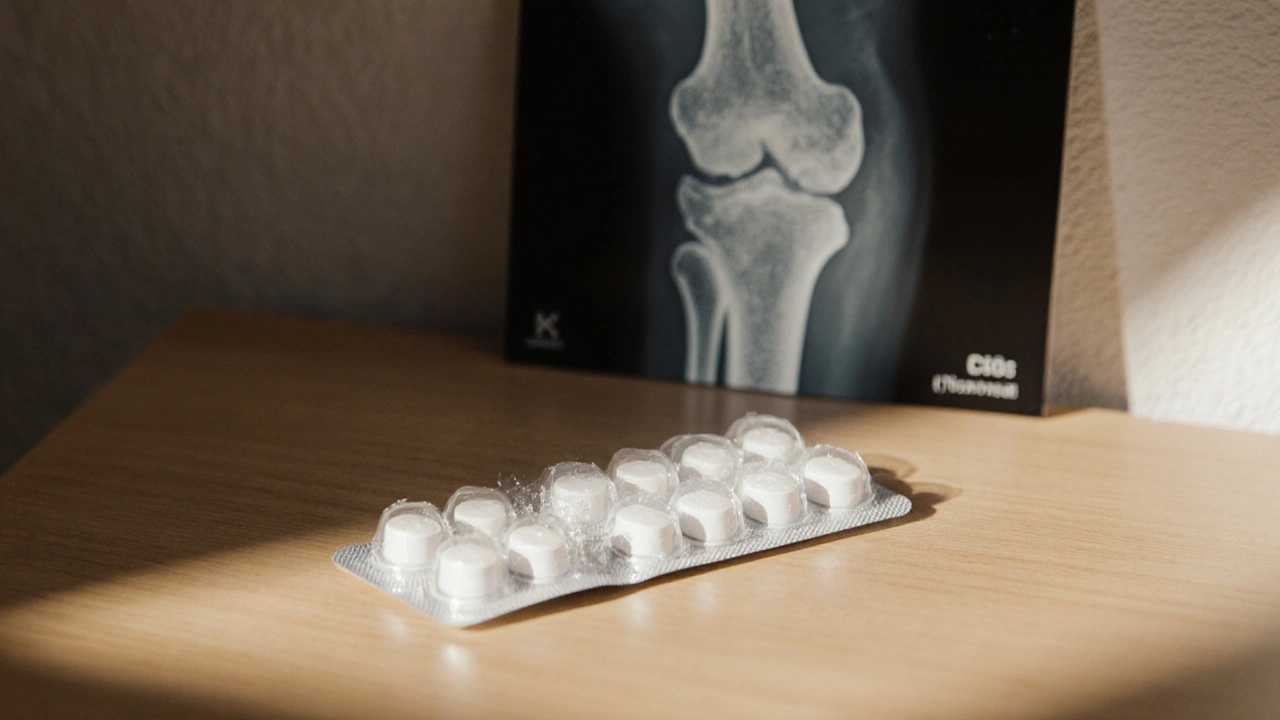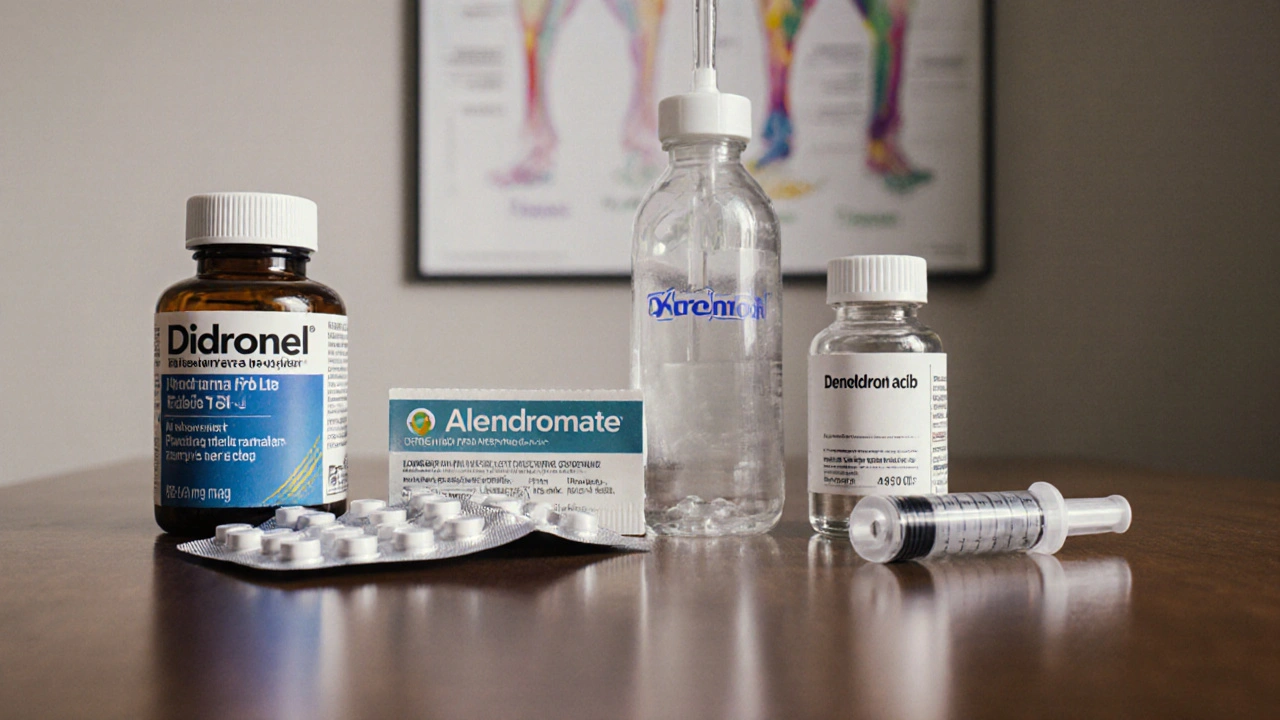
If you or a loved one has been prescribed a bone‑strengthening drug and you’re wondering whether Didronel is the right choice, you’re not alone. This guide walks through what Didronel (etidronate) actually does, how it stacks up against the most common alternatives, and which factors should tip the balance in your favor.
What is Didronel?
Didronel is the trade name for etidronate, a first‑generation bisphosphonate used to slow down abnormal bone resorption.
Approved in the 1970s, Didronel is primarily indicated for Paget’s disease of bone, heterotopic ossification (HO) after joint replacement, and, in some countries, for children with osteogenesis imperfecta. The drug is taken orally, usually at a dose of 400mg daily for 6weeks, followed by a 6‑week drug‑free interval to reduce side‑effects.
How Does Didronel Work?
Bisphosphonates bind to hydroxyapatite crystals in bone, where they are taken up by osteoclasts - the cells that break down bone tissue. Etidronate interferes with the osteoclasts’ ability to attach to bone, thereby curbing the resorption process. Compared with newer agents, etidronate is less potent, which can be an advantage when a mild suppression of bone turnover is desired, such as in the early stages of Paget’s disease or in growing children.
Common Alternatives Overview
Several newer medications belong to the same drug class but differ in potency, administration route, and safety profile. Below are the most frequently considered alternatives:
- Alendronate - a second‑generation oral bisphosphonate taken weekly.
- Risedronate - another weekly oral option, slightly less potent than alendronate.
- Pamidronate - an intravenous bisphosphonate typically given in hospital settings.
- Zoledronic acid - a highly potent IV bisphosphonate administered once‑yearly.
- Denosumab - a monoclonal antibody given as a subcutaneous injection every six months, technically a different drug class.
Each of these drugs targets the same pathway-osteoclast inhibition-but they vary significantly in dosing convenience, side‑effects, and cost.

Side‑Effect Profiles
Understanding safety is key when comparing treatments. Below is a concise rundown:
- Didronel (etidronate): Upset stomach, transient diarrhoea, rare cases of oesophageal irritation. Because it is less potent, the risk of severe hypocalcaemia is lower.
- Alendronate: Upper‑GI irritation, rare oesophageal ulceration, atypical femur fractures with long‑term use, and osteonecrosis of the jaw (ONJ) in high‑risk patients.
- Risedronate: Similar GI profile to alendronate, slightly lower incidence of ONJ.
- Pamidronate: Acute phase reactions (fever, muscle aches) after IV infusion, mild renal toxicity if dosing is not adjusted.
- Zoledronic acid: Stronger acute phase reactions, higher risk of renal impairment, and ONJ with prolonged use.
- Denosumab: Hypocalcaemia, skin infections at injection site, and a reversible rise in bone turnover after discontinuation.
Direct Comparison Table
| Attribute | Didronel (Etidronate) | Alendronate | Risedronate | Pamidronate (IV) | Zoledronic Acid (IV) | Denosumab |
|---|---|---|---|---|---|---|
| Route | Oral (daily) | Oral (weekly) | Oral (weekly) | IV (monthly) | IV (once‑yearly) | Sub‑Q injection (6‑monthly) |
| Potency (relative) | Low | Medium | Medium‑low | High | Very high | High (different mechanism) |
| Typical Indications | Paget’s disease, HO, osteogenesis imperfecta | Osteoporosis, Paget’s disease | Osteoporosis, Paget’s disease | Paget’s disease, metastatic bone disease | Metastatic bone disease, Paget’s disease | Post‑menopausal osteoporosis, bone loss from cancer therapy |
| Major Side‑Effects | GI upset, low hypocalcaemia risk | GI ulceration, ONJ, atypical fractures | GI upset, lower ONJ risk | Acute phase reaction, renal impact | Renal toxicity, severe acute phase reaction | Hypocalcaemia, skin infections |
| Cost (AU$ per year) | ≈$150 | ≈$200 | ≈$210 | ≈$500 (hospital administration) | ≈$1,000 (single dose) | ≈$900 (two injections) |
Decision Guide - When to Choose Didronel vs Alternatives
Picking a medication isn’t just about potency; it’s about matching the drug to the patient’s lifestyle, health status, and treatment goals. Use the checklist below to narrow down the best option.
- Age and growth considerations: For children with osteogenesis imperfecta, a milder agent like Didronel is often preferred because it avoids over‑suppression of bone turnover during growth.
- Adherence potential: If daily pill taking feels burdensome, a weekly oral option (alendronate or risedronate) may improve compliance. For patients who struggle with oral meds, IV options (pamidronate, zoledronic acid) remove the need for daily dosing.
- Renal function: Didronel and oral agents are generally safe for mild renal impairment. IV bisphosphonates require dose adjustments and close monitoring of creatinine.
- Risk of severe side‑effects: If a patient has a history of jaw problems or atypical femur fractures, the low‑potency profile of Didronel becomes attractive.
- Cost constraints: In the Australian public health context, Didronel is often covered under PBS, making it the most economical choice for long‑term management.
When any of the above factors point toward a stronger or differently administered drug, that’s the moment to consider alendronate, zoledronic acid, or denosumab.

Pros & Cons Summary
| Didronel (Etidronate) | Pros | Cons |
|---|---|---|
| Low potency → fewer severe side‑effects; oral daily dosing; well‑tolerated in children; inexpensive; PBS‑listed. | Requires daily intake for 6‑week cycles; less effective for aggressive disease; GI upset common; not ideal for severe osteoporosis. |
Practical Tips & Pitfalls to Avoid
- Take the pill with a full glass of water and stay upright for at least 30minutes to minimise oesophageal irritation.
- Schedule blood tests for calcium and renal function before starting and periodically during therapy.
- Do not combine Didronel with calcium supplements within the same hour - the supplement can bind to the drug and reduce absorption.
- If you miss a dose, take it as soon as you remember unless it’s less than 12hours before the next scheduled dose; then skip the missed one.
- Beware of drug‑drug interactions: thiazide diuretics can raise calcium levels, while corticosteroids may blunt the drug’s effect.
Frequently Asked Questions
What conditions is Didronel actually approved for?
In Australia, Didronel is approved for Paget’s disease of bone, prevention of heterotopic ossification after hip or knee replacement, and for use in children with osteogenesis imperfecta under specialist supervision.
How does the efficacy of Didronel compare to alendronate for Paget’s disease?
Clinical trials from the 1990s showed alendronate normalises alkaline phosphatase levels faster (average 2weeks) than Didronel (average 6weeks). However, long‑term remission rates are similar, and Didronel’s lower side‑effect burden makes it a viable first‑line option for mild disease.
Can I switch from Didronel to a stronger bisphosphonate later?
Yes. Doctors often start patients on Didronel to gauge tolerance, then transition to alendronate or zoledronic acid if disease progression is observed. A wash‑out period of 2weeks is usually recommended before starting the new agent.
Is Didronate safe for people with kidney disease?
Because it’s taken orally and cleared mostly via the gut, Didronel is safer than IV bisphosphonates for mild‑to‑moderate renal impairment (eGFR>30mL/min). Severe kidney disease still warrants caution and close monitoring.
What should I do if I experience severe stomach pain while on Didronel?
Stop the medication immediately and contact your GP. They may order an endoscopy to rule out ulceration and suggest an alternative bisphosphonate with a different dosing schedule.









14 Comments
Didronel feels like a silent agenda drinking water and staying upright is all they want us to do :)
Oh, look at the “miracle” table – they’ve hand‑picked Didronel like it’s the holy grail of bone health. Sure, it’s cheap, but cheap often means “cut corners” on efficacy. If you’re hunting for real power, you should be eyeing alendronate or even denosumab, not this “mild” bisphosphonate. The drama of a daily pill for six weeks? Totally over‑hyped. And that cost comparison? Forget it, the hidden pharmacy fees will bleed you faster than any side‑effect.
Alright, let’s talk about Didronel in plain colors – it’s the beige of bisphosphonates. It does the job, but it’s not the fireworks show you see in the ad‑pages. Kids with osteogenesis imperfecta get a gentle nudge, which is sweet, yet for aggressive Paget’s you might need a bigger hammer. The GI upset? Yeah, that’s the usual party‑favor with any oral bone drug. On the plus side, it’s cheap enough that your wallet won’t scream. But if you crave a stronger punch, alendronate or zoledronic acid are the louder cousins.
From a philosophical angle, Didronel represents the “moderate” path – neither too meek nor too zealous. It’s like sitting in the middle of a debate, listening quietly while the louder voices sway the crowd. Practically, the daily dosing can become a habit, which some patients actually appreciate for routine. Yet, the potency gap compared to newer agents is evident – you won’t see rapid alkaline phosphatase drops. If you value safety over speed, Didronel earns its modest badge. Otherwise, you might be better off with a weekly or intravenous option.
Here’s a thought – the whole “cheaper is safer” narrative is just a smokescreen. Did you know the pharma giants push low‑potency drugs to keep us dependent on follow‑ups? They whisper about “minimal side‑effects” while they’re secretly collecting data on our compliance. If you’re reading this, you’re already in their loop, taking a pill at the same time every day. Think about it – the real control isn’t in the drug, it’s in the schedule they dictate.
Let’s cut to the chase – Didronel is a solid starter for those who can’t handle the heavyweight bisphosphonates. It’s affordable, and the side‑effect profile is tolerable for most patients. However, don’t expect it to be a miracle cure for severe osteoporosis. If the disease progresses, you’ll need to graduate to a stronger agent. Stay proactive, monitor labs, and don’t settle for “just okay” when better options exist.
Yo, if you’re feeling stuck with daily pills, just remember you’ve got the power to switch it up! Didronel’s cheap price tag means you can try it without breaking the bank, but keep an eye on those stomach vibes. Want something stronger? Alendronate’s once‑a‑week vibe might be the sweet spot. Keep moving, stay active, and let your bones do the talking!
Didronel is low‑potency, oral, daily; it’s cheap, it’s safe, it’s simple; however, for aggressive disease consider alendronate, consider zoledronic acid, consider denosumab.
i think didronel is a good option for kids and for mild pagets disease, but if you have a big problem you should talk to your doc. dont forget to take it with a lott of water and stay upright for half hour. also, watch out for any upset stomach it can happen.
From a clinical perspective, Didronel’s pharmacokinetics allow for intermittent dosing, which can be advantageous for patients with adherence challenges. The drug’s lower affinity for hydroxyapatite translates to a milder suppression of bone turnover, reducing the risk of oversuppression. Nevertheless, the therapeutic ceiling is limited, making it less suitable for high‑risk osteoporosis. Routine monitoring of serum calcium and renal function remains essential throughout therapy. In summary, Didronel occupies a niche where safety outweighs maximal efficacy.
Ah, the grand tableau of bone‑health economics – a ballet of profit and prudence. When you peer beyond the glossy pamphlet, you discover that Didronel is but a footnote in the saga of pharmaceutical grandstanding. Its modest efficacy is celebrated by budget committees, yet the real connoisseurs of skeletal fortitude know to seek the aristocracy of agents – alendronate, zoledronic acid, denosumab. The latter, with its semi‑annual injections, feels like a ritual, a covenant between patient and provider, while Didronel merely whispers in the hallway. Moreover, the subtle gastrointestinal complaints are often dismissed as “minor inconveniences,” a euphemism that masks the daily rite of standing upright for a half‑hour. One must also consider the insidious impact on calcium homeostasis; albeit lower, the risk remains, especially in the elderly. The cost analysis, though favorable on paper, neglects the hidden expenses of physician visits, laboratory assays, and the intangible toll of medication fatigue. In a world where bone‑resorbing monsters lurk, why arm yourself with a slingshot when a cannon is within reach? The narrative that cheaper equals safer is a myth perpetuated by insurance algorithms designed to preserve profit margins. Let us not be seduced by the allure of affordability alone. The ultimate decision should rest upon a balanced appraisal of potency, convenience, and long‑term skeletal outcomes. 🦴✨
Look, the idea that Didronel is some covert conspiracy is pure nonsense. It’s a legitimate drug approved by health authorities, not a mind‑control experiment. If you want real strength, pick the high‑potency options, not some weak placebo. Don’t let paranoia dictate your health choices.
We must keep the tone factual and avoid exaggeration. Didronel is approved for specific indications and has a safety profile. It is not a silver bullet but it does have a role in treatment.
Nice point about the weekly options – they’re definitely easier for many folks. Switching from daily to a weekly schedule can improve adherence without any drama.